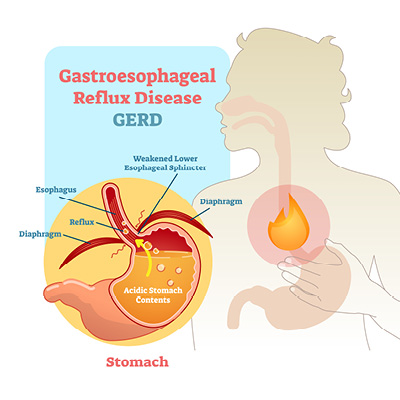Extinguishing the Burn of GERD
Posted January 25, 2021 by Tyler Bedford, M.D.

Most of us have been there, you meet with friends or family and overdo it a little. Maybe it’s that extra beer or glass of wine or the heaping scoop of Uncle Kenny’s buffalo cheese dip; but the end result is predictable. You get home and snuggle up in bed only to have that unpleasant feeling of burning in your chest and that bitter taste that seems to flow up into your mouth. It’s not a very tantalizing subject but nearly everyone has experienced reflux at some point in their lifetime. Let’s dive into this subject a bit further with some commonly asked questions.
What is reflux?
Let’s review the anatomy briefly. When we swallow food it goes into the esophagus and then into the stomach. The stomach is a hostile, acidic environment. Normally, a complex muscular valve keeps that acid in the stomach. Reflux occurs when stomach contents flow into the esophagus. More commonly, we refer to the symptomatic part of acid entering the esophagus, and this is known as acid reflux or heartburn. When this occurs occasionally, or a few times a month, it is typically best treated with diet modification, weight loss, and the occasional use of over the counter medications.
I can eat anything and have never had heartburn. Could I still be at risk?
While heartburn typically causes classic symptoms, there are some other times when heartburn can be a little bit sneakier. I frequently see patients that are referred by my colleagues that treat patients with breathing problems or a chronic cough. In this scenario, the acid goes into the airway and can present as coughing, an asthma like condition, frequent pneumonia, and shortness of breath. Another common scenario occurs when patients attribute their symptoms to a heart attack. Once the heart has been ruled out as the problem heartburn is often the culprit.
What causes heartburn?
The muscular valve between the esophagus and stomach usually keeps acid in the stomach. Heartburn occurs when this valve system is not functioning properly. There are a few things that affect this valve and increase heartburn. Smoking, alcohol, caffeine, certain foods, medications, pregnancy, and being overweight can make someone more prone to heartburn. A hiatal hernia is also a frequent cause of heartburn.
So when should I be concerned?
If you are having frequent heartburn, or more than twice a week, you should discuss this with your doctor. Frequent heartburn can lead to a condition known as gastroesophageal reflux disease or GERD. Additionally, you should discuss your symptoms with your doctor if you have any of the following; symptoms despite using over the counter medication, unexplained weight loss, difficulty with swallowing, or any signs of bleeding such as vomiting blood or dark stools.
Why don’t I just take medication for my heartburn?
Medications for heartburn and GERD are targeted at reducing the acid in the stomach. Medications treat the symptoms of reflux but not the cause of heartburn which is a typically a loose valve between the esophagus and the stomach. The most commonly used medication for frequent heartburn is known as a proton pump inhibitor. You’ve probably seen ads for these medications commonly known as Protonix, Prevacid, Prilosec, and Nexium amongst others. These medications have received much discussion lately as they might be associated with adverse side effects with long term use. Some of the possible associations with long term use of these medications include osteoporosis, kidney disease, electrolyte abnormalities, memory loss, pneumonia, gastrointestinal infections, and cancer. Further study is ongoing regarding the direct relationship with heartburn medication and the above medical conditions so a direct link cannot yet be made. There is absolutely a benefit to taking these medications when used appropriately. For many of my patients, long-term use of these medications is not desired and they seek help to be liberated from taking a daily medication for their heartburn.
Can I see a surgeon for my reflux?
Absolutely. Summa Health has a comprehensive reflux center. We accept any patients with symptoms of reflux. At the initial appointment, we will discuss your symptoms and develop an individualized plan that is specific to your needs. We will tailor your treatment specifically to your situation and we are experts at treating reflux both medically and surgically. All of our testing and treatment options are available right here in northeast Ohio at Summa Akron City Hospital without any need for referral to other locations. Additionally, we can get the process started at our many satellite locations by seeing one of our specialists.
If you are experiencing GERD symptoms, talk to your doctor about the many treatment options available. You can schedule an appointment with Summa Health by calling 330.761.1111.
About the Author
Vitality eNews Sign Up
Receive the Summa Health eNewsletter for the latest health tips, advice and updates.


 Listen to this episode of the Healthy Vitals Podcast featuring Joseph Dankoff, MD.
Listen to this episode of the Healthy Vitals Podcast featuring Joseph Dankoff, MD.